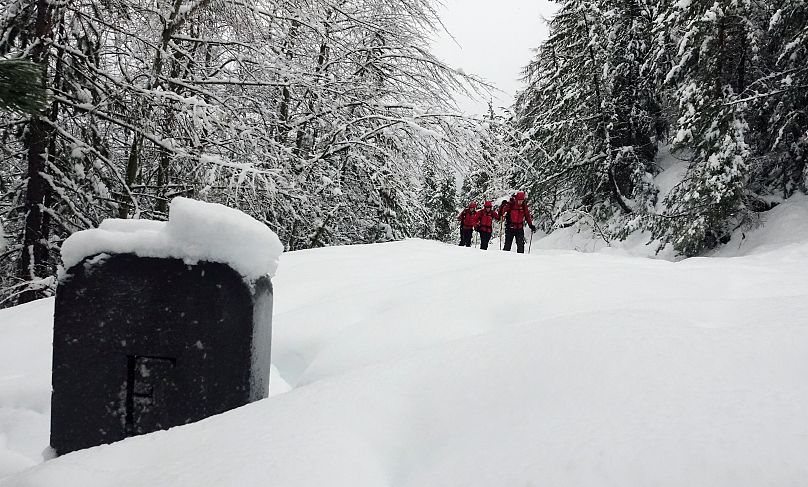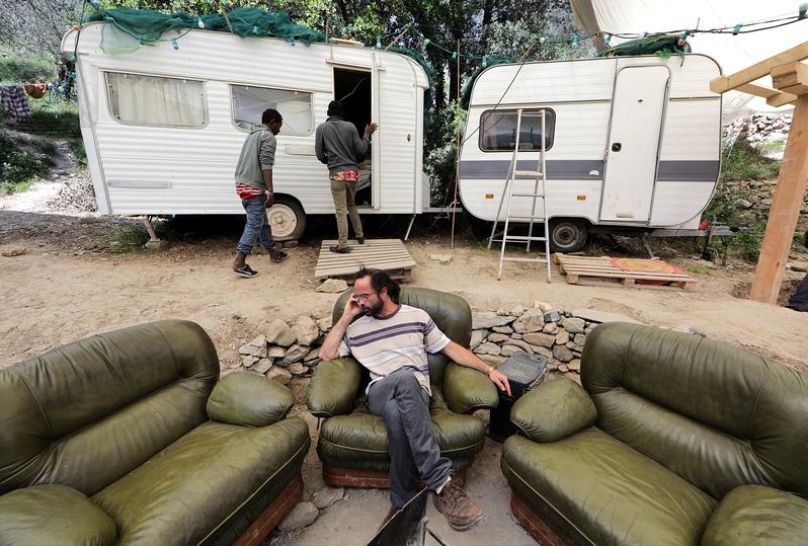The volunteer faced a three-month suspended sentence if the court had upheld his conviction for “facilitating irregular entry”
A French appeal court ruled on Thursday that mountain guide Pierre Mumber committed no crime in providing help to asylum-seekers in the Alps last year, his lawyer told Euronews
He faced a three-month suspended sentence if the court had upheld his conviction for “facilitating irregular entry”.
The verdict is a relief to Mumber and his advocates, who kept saying the mountaineer only offered hot tea and warm clothes to four West Africans who arrived in France through the mountains from Italy.
The volunteer told Euronews that he had mixed feelings after this ruling.
“I am satisfied to see that there is a bare minimum of justice in France," he said.
“I am relieved and at the same time I am worried, a bit bitter to see that one can end up in court simply because people who are police officers make false statements."
“I had proof of my innocence, but if I did not have that proof, I do not know where I would be today."
Mumber added that he will continue “providing support to those in exile in France" in the future.
Ahead of the verdict, Euronews looked into the case as so-called 'solidarity crimes' are the focus of mounting controversy in France and Europe.
What was Mumber accused of?
Since the beginning of the migration crisis in 2015, Mumber, like hundreds of other people living along the French-Italian border, has been participating in “maraudes”- the name that is given in France to roaming operations intended to help those in need.
The incident Mumber was charged for occurred on January 6 last year. The mountain guide and other volunteers were roaming the border when they found four migrants. One of them was a seriously injured Nigerian woman.
Then two police officers arrived and took the migrants to their cars, accompanied by Mumber.
According to French authorities, Mumber opened the doors of the car to help the group escape - except for the wounded woman. The migrants were never found again.
"I was convicted on the basis of false police statements. The police told a story that is not mine, they blamed me for things that I did not do," Mumber told Euronews before his appeal trial.
"They used me as a pretence, saying well, if we did not manage to catch these people, it's because of him."
"The purpose is to discourage people who show solidarity with foreigners,” he continued.
“Pierre committed no crime. But his conviction following this act of kindness shows how the French authorities are misusing the anti-smuggling law to criminalise people who offer help to those on the move,” said Rym Khadhraoui, Research Fellow at Amnesty International ahead of the appeal court's verdict.
Since the beginning of the migration crisis, thousands of asylum-seekers have crossed the French-Italian border. As they do not know the area, they often get lost in the mountains, freeze or get seriously injured.
“At the border, 4 or 5 people have already died, some of them not far from the city,” said Mumber.
“It’s hard for me to accept that 20-year-old guys die at our doorstep simply because they are trying to get into our country. It’s impossible to accept”.
Is Mumber an isolated case?
According to local NGOs, about two hundred people took part in the “maraudes” in the French-Italian border region, helping to rescue about 800 refugees.
Mumber's case is far from being isolated. Michel Rousseau, of the French NGO 'Tous Migrants' told Euronews that around twenty volunteers had been prosecuted since 2017 - and the vast majority convicted.
Last month, appeal judges convicted another mountain volunteer, Kevin Lucas, to a two-month suspended jail sentence after he helped five migrants in March 2018, his Attorney Maeva Binimelis told Euronews. The initial ruling foresaw a four-month sentence.
Binimelis told Euronews her client will challenge the ruling before France’s court of cassation.
Although both cases are distinct, Kevin Lucas and Pierre Mumber’s trials both fall under a so-called “solidarity crime,” Binimelis said, denouncing current repressive policies towards those who help migrants.
“[The ruling] is confirmation that proofs of humanity are unwanted,” Binimelis said.
What does French law say?
Under a 1945 law, “any person who, as a result of direct or indirect assistance, facilitated or attempted to facilitate the entry, movement or illegal residence of a foreigner in France” faces a jail sentence of up to five years and a fine of €30,000.
However, a few highly publicised cases forced the French government to soften the law.
Last year, France's top court ruled that the “principle of fraternity” should have shielded olive farmer Cedric Herrou from prosecution over his role in helping hundreds of migrants to enter the country illegally.
READ MORE: French Constitutional Court sides with farmer who helps migrants
As a result, President Emmanuel Macron's government adopted a new law in August 2018 shielding from prosecution “any person or organisation when the act has not given rise to any direct or indirect compensation and has consisted in providing legal, linguistic or social advice or support, or any other aid provided exclusively for humanitarian purposes".
Yet prosecutions of volunteers have continued. According to rights groups, one reason is that courts tend to consider that pro-migrant activism is not gratuitous and thus doesn't fall under the humanitarian exemption.
“Our government, like many European governments, decided to turn migrants into scapegoats,” Rousseau told Euronews.
“And, like many other governments, they decided to build walls, symbolic or real, so that people fleeing from poverty and oppression could not find refuge in our countries."
Do 'solidarity crimes' exist in other European countries?
According to GISTI, a French non-profit organisation, France is not alone in criminalising solidarity towards migrants.
Germany, Belgium, Denmark, Greece and Italy punish helping the illegal entry of foreigners when it is for profit. Yet the organisation has documented a number of examples of people who helped migrants gratuitously in these countries and ended up in court.
Open Democracy, a global media platform, compiled "a list of more than 250 people across 14 countries who have been arrested, charged or investigated under a range of laws over the last five years for supporting migrants."
Seven countries concentrated the vast majority of cases: Italy, Greece, France, the UK, Germany, Denmark and Spain.













